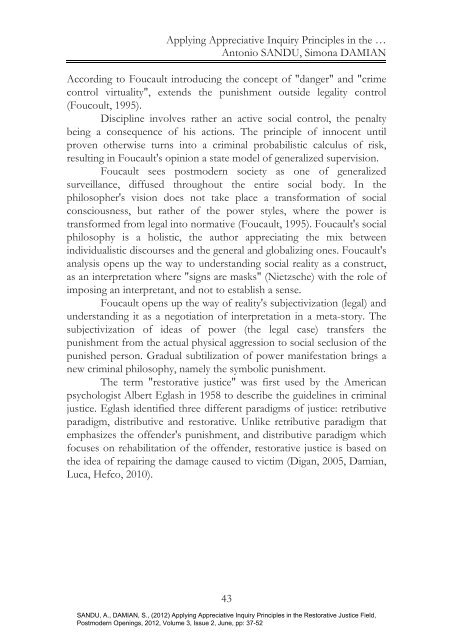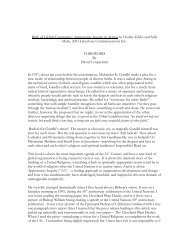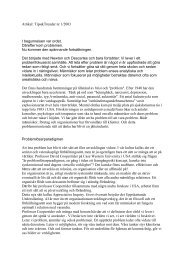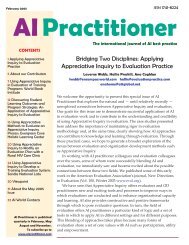Applying Appreciative Inquiry Principles in the Restorative Justice ...
Applying Appreciative Inquiry Principles in the Restorative Justice ...
Applying Appreciative Inquiry Principles in the Restorative Justice ...
Create successful ePaper yourself
Turn your PDF publications into a flip-book with our unique Google optimized e-Paper software.
<strong>Apply<strong>in</strong>g</strong> <strong>Appreciative</strong> <strong>Inquiry</strong> <strong>Pr<strong>in</strong>ciples</strong> <strong>in</strong> <strong>the</strong> …<br />
Antonio SANDU, Simona DAMIAN<br />
Accord<strong>in</strong>g to Foucault <strong>in</strong>troduc<strong>in</strong>g <strong>the</strong> concept of "danger" and "crime<br />
control virtuality", extends <strong>the</strong> punishment outside legality control<br />
(Foucoult, 1995).<br />
Discipl<strong>in</strong>e <strong>in</strong>volves ra<strong>the</strong>r an active social control, <strong>the</strong> penalty<br />
be<strong>in</strong>g a consequence of his actions. The pr<strong>in</strong>ciple of <strong>in</strong>nocent until<br />
proven o<strong>the</strong>rwise turns <strong>in</strong>to a crim<strong>in</strong>al probabilistic calculus of risk,<br />
result<strong>in</strong>g <strong>in</strong> Foucault's op<strong>in</strong>ion a state model of generalized supervision.<br />
Foucault sees postmodern society as one of generalized<br />
surveillance, diffused throughout <strong>the</strong> entire social body. In <strong>the</strong><br />
philosopher's vision does not take place a transformation of social<br />
consciousness, but ra<strong>the</strong>r of <strong>the</strong> power styles, where <strong>the</strong> power is<br />
transformed from legal <strong>in</strong>to normative (Foucault, 1995). Foucault's social<br />
philosophy is a holistic, <strong>the</strong> author appreciat<strong>in</strong>g <strong>the</strong> mix between<br />
<strong>in</strong>dividualistic discourses and <strong>the</strong> general and globaliz<strong>in</strong>g ones. Foucault's<br />
analysis opens up <strong>the</strong> way to understand<strong>in</strong>g social reality as a construct,<br />
as an <strong>in</strong>terpretation where "signs are masks" (Nietzsche) with <strong>the</strong> role of<br />
impos<strong>in</strong>g an <strong>in</strong>terpretant, and not to establish a sense.<br />
Foucault opens up <strong>the</strong> way of reality's subjectivization (legal) and<br />
understand<strong>in</strong>g it as a negotiation of <strong>in</strong>terpretation <strong>in</strong> a meta-story. The<br />
subjectivization of ideas of power (<strong>the</strong> legal case) transfers <strong>the</strong><br />
punishment from <strong>the</strong> actual physical aggression to social seclusion of <strong>the</strong><br />
punished person. Gradual subtilization of power manifestation br<strong>in</strong>gs a<br />
new crim<strong>in</strong>al philosophy, namely <strong>the</strong> symbolic punishment.<br />
The term "restorative justice" was first used by <strong>the</strong> American<br />
psychologist Albert Eglash <strong>in</strong> 1958 to describe <strong>the</strong> guidel<strong>in</strong>es <strong>in</strong> crim<strong>in</strong>al<br />
justice. Eglash identified three different paradigms of justice: retributive<br />
paradigm, distributive and restorative. Unlike retributive paradigm that<br />
emphasizes <strong>the</strong> offender's punishment, and distributive paradigm which<br />
focuses on rehabilitation of <strong>the</strong> offender, restorative justice is based on<br />
<strong>the</strong> idea of repair<strong>in</strong>g <strong>the</strong> damage caused to victim (Digan, 2005, Damian,<br />
Luca, Hefco, 2010).<br />
43<br />
SANDU, A., DAMIAN, S., (2012) <strong>Apply<strong>in</strong>g</strong> <strong>Appreciative</strong> <strong>Inquiry</strong> <strong>Pr<strong>in</strong>ciples</strong> <strong>in</strong> <strong>the</strong> <strong>Restorative</strong> <strong>Justice</strong> Field,<br />
Postmodern Open<strong>in</strong>gs, 2012, Volume 3, Issue 2, June, pp: 37-52






